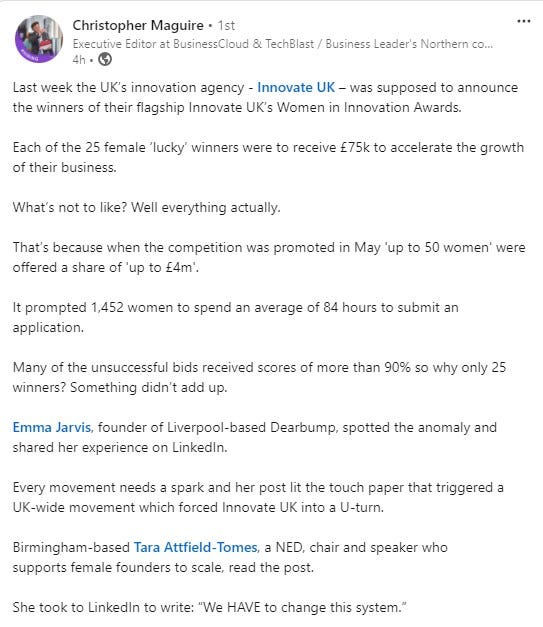What I've Been Reading: Google's top stories problem + when the crowd turns against innovation funding
Plus some of my writing for The Lancashire Lead
Good afternoon,
My digest is back after a summer hiatus (save for the August riots week when there was an extra edition). For those who have recently signed up, the aim is a few interesting things in the digital media space (be that journalism, SEO, socials or more) which have crossed my eyeline in the last seven days or so.
If you spot something you think I should include and you think the 135 avid readers of this weekly digest (one of the nice things about Substack is it shows you can really build a very loyal audience fairly swiftly) should be seeing then feel free to drop it to ed@almaonline.co.uk
We’ll kick off with two pieces which both point to a similar theme - is Google’s top stories broken?
Google’s Top stories looks broken: Are news publishers to blame? - Nicola Agius - this deep-dive in Search Engine Land goes through how there’s increasing evidence to show particularly global news outlets are ranking with regularity for fairly localised news searches. This has come to prominence during the general election in the UK in July - and during the riots which took place in early August too.
There used to be a relevance, or prominence given to publishers who wrote with regularity, consistency and quality about a location or a topic and therefore a weight in top stories. But as Nicola alludes to, this seems to have gone out of the window meaning where titles have a lot of particularly syndicated news wire copy (think PA, Reuters etc) they’ll see sudden spikes as big breaking news events or themes bubble up.
What does that do? It throttles how well original, local, on the ground, reporting is being seen. Which is a concerning trend. From Google’s perspective, playing devils advocate, it means they are able to service their top stories box in a far economical way. Whether that’s good for readers and the quality of search results, that’s not so clear.
And as the piece below shows, it means there’s diversity in the top stories results but not from people you’d expect to be producing ‘stories’.
From my very informal checking, a Google incognito search for BBC Radio 2 In The Park - which is *the* big event in Preston this weekend, then all is well in terms of signposting to local and original content. But it’ll be interesting to see if that maintains as the event itself starts from Friday and no doubt search interest increases and the volume of content from more sources increases too…
PR and betting companies have articles indexed in Google Top Stories - Charlotte Tobitt - PressGazette looked into which publishers are seeing the strongest performance in a tool called Newzdash which gives an indication and score of which websites have a good top stories hit-rate for being seen. There’s familiar names within there (Yahoo, USA Today etc) but the research also shows betting sites, PR firm websites and government websites are also showing.
While no doubt Google wants to pull from a diverse list of sources it needs to be careful not to make that too broad. It’s definition of ‘news’ needs to be careful not to creep too far.
The full story of how Innovate UK messed with the wrong women - Chris Maguire - as well as the piece itself, which is a real example of a digital community forming very quickly to then expose what turned out to be a sham of an awards/funding process which was opaque to say the least, then it’s worth a read of Chris’ LinkedIn post.
In it he gives some additional background and how the story unfolded. It’s a reminder, to me, that people always appreciate us as journalists and editors giving some extra context. Which Chris does very well (and consistently too).
It’s easy to publish, move on, and not explain. But then it becomes just another headline or post.
And finally, during August I’ve written two pieces for The Lancashire Lead. We’re seeing more first-person writing and reflection on news events themselves is really engaging our audiences on Substack - as well as giving a digest.
The first was a piece of what it was like when I, and family/friends, were on a train between Halifax and Preston which sadly hit someone who was on the tracks. The second was reflecting on approaching a ‘death anniversary’ as it is four years since my Dad died. Both a bit morbid, I admit, but it felt important to write them both.
Thanks to everyone who took the time to send a message in response to both pieces, it’s always interesting to see what prompts people to get in touch.
That’s this week’s digest done and thanks for reading, and hope you’re glad to see it back in the inboxes.
Until next week. All the best and keep going.
Ed





